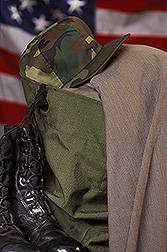This page has been archived and is being provided for reference purposes only. The page is no longer being updated, and therefore, links on the page may be invalid.
ARS Seeks Business Partner for Flame-Resistant Wool
By Kim KaplanDecember 22, 2006
The Agricultural Research Service (ARS) is looking for a business partner to license a new product that can be applied to wool fabrics and wool-rich blends to make them much more flame-resistant.
Adding flame and extreme heat resistance is of particular interest to the Department of Defense (DOD), which is seeking ways to have uniforms that are comfortable, washable and that will not melt and form hard beads that can drip into open wounds, exacerbating injuries the way polyester fabrics do.
Wool already has some natural resistance to burning, but the Department of Defense would like to have even more flame retardancy in their uniforms.
Other potential uses include uniforms for people who are exposed to extremely fire-hazardous situations, woolen underwear and sleepwear. Current technologies to add heat resistance employ metals or chemicals that are considered environmentally unfriendly.
In contrast, the new ARS technology was designed to be applied as a finish to ARS-developed enzyme-polished, machine-washable wool. The compound can be applied to yarn, fabric and finished garments, according to ARS research chemist Jeanette M. Cardamone, with the ARS Fats, Oils and Animal Coproducts Research Unit of the Eastern Regional Research Center, Wyndmoor, Penn. Cardamone developed the new technology.
A business partner will be able to help more fully evaluate the new technology's commercial potential, such as how long it will stand up to machine washing.
Further details are available at ARS websites that describe the technology and outline how to obtain licenses.
ARS is the U.S. Department of Agriculture's chief scientific research agency.


